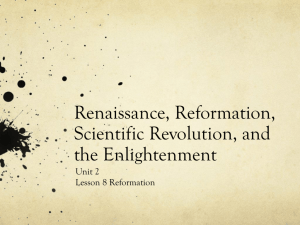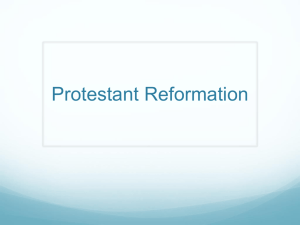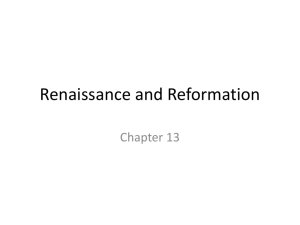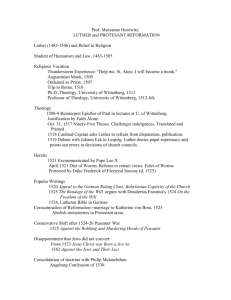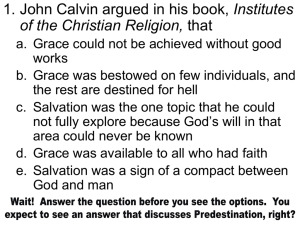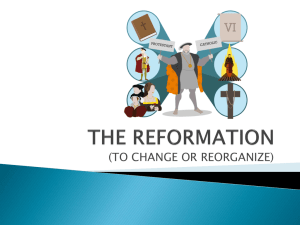Section 2.9
advertisement
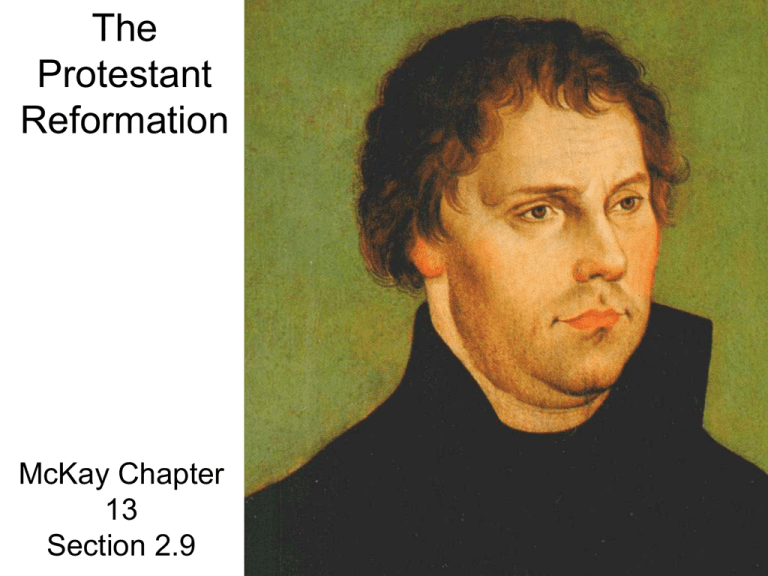
The Protestant Reformation McKay Chapter 13 Section 2.9 The Reformation Great Schism Conciliar Movement ends Calvin rules Geneva Luther’s 95 Thesis 1309 1378 1417 Council of Trent Act of Supremacy 1513 1517 1521 1525 1534 1536 1541 1545 1555 Italian Renaissance Calvin’s Institutes of Christian Religion Babylonian Captivity Erasmus’ In Praise of Folly Peasants’ War Diet of Worms Peace of Augsburg Long-term Causes of the Reformation • Religious – Corruption • Simony, pluralism, nepotism, moral decay • • • • – Babylonian Captivity – Great Schism Political – Resentment of Church interference in state affairs Economic – Tithe, usury laws Intellectual – Renaissance thought encouraged many to question Church’s teachings Technological – Guttenberg's printing press Pope Alexander VI (1492-1503) of the Borgia Family Martin Luther (1483-1546) • Augustinian German monk and professor or religion at Wittenberg • Johann Tetzel (1465-1519) – Authorized to sell indulgences by Pope Leo X • “As soon as gold in the basin rings, the souls in purgatory spring” • 95 Theses (10/31/1517) – Criticized sale of indulgences/papal wealth/papal authority – Common method to spark debate among theologians • Leipzig Debate (1520) – Luther debated Johann Eck • Denied Papal infallibility, criticized burning of Hus • Luther protected by Frederick III of Saxony (an Luther’s Theology (1517-1520) • • • • • • • • • Faith Alone Bible ultimate authority Priesthood of All Believers Secular life can be just a holy as monastic Rejects celibacy Baptism and communion only sacraments No purgatory Transubstantiation by presence Secular rulers are supreme authority in all matters except theological Diet of Worms (1521) • Tribunal of the HRE • Charles V promised no subject excommunicated without a trial • Luther placed on trial at Diet of Worms • HRE Charles V ordered Luther to recant his beliefs • “to go against conscience is neither right nor safe” • Pope Leo X excommunicates him in 1521 Protestantism • Luther hid under protection of Frederick of Saxony – Translates Bible into German • Democratizes religion • Encourages literacy • Northern German princes turned to Lutheranism – Way to stop Church authority – Opportunity to seize lands – Liked “Address to the Christian Nobility of the German Nation” (1520) • Diet of Speyer (1529) Charles V orders Luther and his followers arrested • Princes issue defiant protest – Hence the term Protestant – Form the League of Schmalkaden in 1531 • Allied with French King Francis I (who ironically was Catholic) Address the Christian Nobility of the German Nation (1520) . . Poor Germans that we are--we have been deceived! We were born to be masters, and we have been compelled to bow the head beneath the yoke of our tyrants, and to become slaves. Name, title, outward signs of royalty, we possess all these; force, power, right, liberty, all these have gone over to the popes, who have robbed us of them. They get the kernel, we get the husk . . . It is time the glorious Teutonic people should cease to be the puppet of the Roman pontiff. Because the pope crowns the emperor, it does not follow that the pope is superior to the emperor. Samuel, who crowned Saul and David, was not above these kings, nor Nathan above Solomon, whom he consecrated . . . Let the emperor then be a veritable emperor and no longer allow himself to be stripped of his sword or of his scepter! . . . The Swabian Peasant Uprising (1525) • Peasant Revolts – Twelve Articles (1525) – Used Biblical scripture to justify their rebellion – Demanded social and economic equality • End to serfdom, tithes, feudalism • Inspired by Luther's theology • “Against the Murdering Thieving Hordes of Peasants” (1525) – Luther condemns the peasants – Used scripture to repudiate Twelve Articles – Calls for their liquidation The Twelve Articles of the Swabian Peasants (March 1525) • The Seventh Article • Seventh, we will not hereafter allow ourselves to be farther oppressed by our lords, but will let them demand only what is just and proper according to the word of the agreement between the lord and the peasant. The lord should no longer try to force more services or other dues from the peasant without payment, but permit the peasant to enjoy his holding in peace and quiet. The peasant should, however, help the lord when it is necessary, and at proper times when it will not be disadvantageous to the peasant and for a suitable payment. “Against the Murdering Thieving Hordes of Peasants” (1525) • With threefold horrible sins against God and men have these peasants loaded themselves, for which they have deserved a manifold death of body and soul. • First they have sworn to their true and gracious rulers to be submissive and obedient, in accord with God's command (Matt. xxii. 21), "Render therefore unto Caesar the things which are Caesar's," and (Rom. xiii. 1), "Let every soul be subject unto the higher powers." But since they have deliberately an sacrilegiously abandoned their obedience, and in addition have dared to oppose their lords, they have thereby forfeited body an soul, as perfidious, perjured, lying, disobedient wretches and scoundrels are wont to do. Wherefore St. Paul judges them, saying (Rom. xiii. 2.), "And they that resist shall receive to themselves damnation." The peasants will incur this sentence, sooner or later; for God wills that fidelity and allegiance shall be sacredly kept. Hapsburg-Valois Wars • Series of 5 wars between France and HRE (1521-1555) • France allied with League of Schmalkaden 1531 – Alliance of Protestant rulers (and Catholic France) formed against Charles V (HRE) – Pope refuses to help Charles (resents Hapsburg power) • France policy is to keep Germany divided • Charles defeated the League in 1547 but never restored Catholicism • Peace of Augsburg 1555 – permanent division of Germany into Lutheran and Catholic areas – Cius regio eius religio Charles V Anabaptist • Rejected idea of infant baptism • Only adults can make that choice • Reactionary – sought early Christianity of voluntary association • Only a few received inner light – Believed in religious toleration • Rejected idea of state established church • Allowed women into ministry • Egalitarian with all goods • Refused to serve in public office & military – Intensely pacifist • Attracted poor, uneducated urban • Believed in separation of Church and State • Civil Authorities were terrified – Would lead to secularization and civil war • Banished or executed throughout Europe • Impact – Quakers, Congregationalists and US Anabaptist Cages of Munster • • • • • • John Calvin Priest and lawyer Institutes of Christian Religion (1536) Bible final authority faith alone affirmed Viewed man as sinful, corrupted Predestination – God already determined who will be saved – Fatalist • Geneva Consistory – ruled city as a theocracy – Michael Servetus burned at stake for denying Trinity and Baptism • Women • Obedient to husbands • Impact – Spreads in form of Huguenots, Presbyterianism, Puritanism, Congregationalism Henry VIII • Ascended to throne in 1509 (17 yrs. Old) • Married his brother’s widow (Catherine of Aragon) • Extremely Catholic • Heard up to 5 masses a day (except during hunting season) • Penned (with More’s help) The Defence of the Seven Sacraments – awarded the title "Defender of the Faith" (Fidei Defensor) by Pope Leo X. • Lacked male heir to throne • Thomas Cromwell – Henry’s chief minister 1532–1540 – Steered a series of acts through Parliament which gradually made Church in England subservient to Henry • Asked Pope to annul marriage to Catherine of Aragon (Charles V’s aunt) – Based on Leviticus passage Henry VIII Catherine of Aragon Anglican Reformation • Pope Clement VII (1523-1534) – remained silent – Charles V’s soldiers are stationed in Rome • Henry – Married Anne Boleyn Jan. 1533 (6 months pregnant) • Act of Supremacy 1534 – "supreme head in earth of the Church of England" and disregarded any "usage, custom, foreign laws, foreign authority [or] prescription" – Parliament says monarchy head of Church of England • Six Articles (1539) – Retained Catholic practices – Transubstantiation, confession, celibacy, etc. – Restricted Bible reading to Nobility, clergy Anne Boleyn Resistance • Dissolution of the Monasteries (1534) – Closed monasteries, seized church lands (gives to nobles) – Catholic Church owned 33% of land – Pilgrimage of Grace • Uprising in N. England crushed • Treason Act of 1534 – Thomas More executed – Anne executed for adultery and incest in 1536 Edward VI Reformation • Edward VI (1547-1553) – 9 years old son of Jane Seymour – Duke of Somerset (Seymour) appointed Regent – Devout protestant – Iconoclastic, processions, banned, celibacy banned, Six Articles repealed – Dies shortly after taking throne Bloody Mary (1553-1558) • Mary Tudor – Daughter of Henry and Catherine of Aragon – Devout Catholic – Marries Philip of Spain • Philip not coroneted King of England – Burned 300 Protestants at the state • Including Thomas Cramner whose recantation would have been a political victory for Mary – Set people against her rule – Believed she was pregnant – Died (of cancer) in 1558 Elizabethan Settlement • Elizabeth Tudor (1558-1603) • Moderate Protestant • Can’t be Catholic – A bastard in eyes of Catholic Church • Made concessions to both Catholics and Protestants – Priests allowed to marry – Catholic ritual (golden crucifix, robes, etc.) retained • Act of Supremacy – Elizabeth head of Church • Act of Uniformity (1558) – Forced people to attend Anglican church – Revoked harsh laws against Catholics • Gives rise to Puritan Movement Protestant Beliefs consolidated • Reject papal authority • Reject special character of priesthood • Accept clerical marriage • Reject monastic life • Vernacular over Latin • Sacraments reduced (2 or 3) • Deny transubstantiation • Deny priestly absolution of sin • Deny purgatory • Reject cult of saints and Virgin • Emphasize Bible as supreme authority • Allow for private judgment • Parenthood praised
